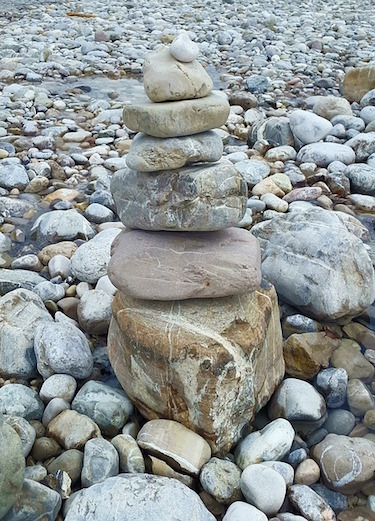 Lately I’ve been thinking a lot about memorial stones. In the Old Testament, we read about memorial stones people set up to commemorate a special event or encounter with God. The morning after Jacob wrestled with God, he set up a stone (Genesis 28:18-22) as a reminder of his experience at that place. After Joshua led the children of Israel across the Jordan River, God told them to take twelve stones from the middle of the riverbed to the new land where they were going. He also had twelve stones placed in a pile in the middle of the river as a memorial of their crossing into the Promised Land.
Lately I’ve been thinking a lot about memorial stones. In the Old Testament, we read about memorial stones people set up to commemorate a special event or encounter with God. The morning after Jacob wrestled with God, he set up a stone (Genesis 28:18-22) as a reminder of his experience at that place. After Joshua led the children of Israel across the Jordan River, God told them to take twelve stones from the middle of the riverbed to the new land where they were going. He also had twelve stones placed in a pile in the middle of the river as a memorial of their crossing into the Promised Land.
In our day, we have memorial stones as well: war monuments, wedding rings, tassels from our graduation hats, inscribed cornerstones on buildings, blue ribbons from a long-ago fair. Objects like these serve as symbols or reminders of important times or places in our lives.
Not all memorial stones are physical objects; many are actions we take to celebrate important events. Communion, for example, is a tangible reminder of Jesus’ death on the cross. He broke the loaf of bread and gave it to the disciples as a reminder of His body, broken for them. Then he shared the cup of wine with them, as a reminder of His shed blood. “Do this,” he said, “in remembrance of Me” (Luke 21:19). Two thousand years later, Christians the world over continue to observe the breaking of bread and sharing of the cup, to “proclaim His death until he comes” (1 Corinthians 11:26). This is not just a ritual or tradition, but a time to ponder what Jesus did for us.
These examples in the Bible show us the importance of remembering our special encounters with God, and all the good things he has done in our lives. In Deuteronomy 6:11-12, before the Israelites crossed over the Jordan into the promised land, He warned them,” When you have eaten and are full beware, lest you forget the Lord who brought you out of the land of Egypt, out of the house of bondage.”
We find a story in Matthew 16:5-12 showing us that Jesus was not pleased when his disciples failed to remember the two times He fed thousands of people with a few loaves and fish. ”Do you not understand or remember?” He asked them (v. 9). Remembering God’s goodness in the past helps us trust him in our present circumstances.
Forty-five years ago, on March 16, 1972, at a prayer meeting with a group of friends and neighbors, I asked Jesus to become my Lord and Savior. After the prayer meeting ended, we all went to McDonald’s for dinner. We all had Shamrock Shakes. A year later, when the anniversary of that day came around, one of my friends said, “Remember how we all went out for Shamrock Shakes after the meeting where you got saved?” So she and I went to McDonald’s for Shamrock Shakes to celebrate my new life in Christ.
Now every year in the middle of March you’ll find me pulling into the McDonald’s drive-up window or walking into  the restaurant, ordering a Shamrock Shake. Sometimes I go by myself and quietly contemplate that day, and the life I’ve had since then because of what Jesus did for me. Other years I may share the experience, and my story, with others. I’m pretty sure I’ve never missed a year.
the restaurant, ordering a Shamrock Shake. Sometimes I go by myself and quietly contemplate that day, and the life I’ve had since then because of what Jesus did for me. Other years I may share the experience, and my story, with others. I’m pretty sure I’ve never missed a year.
The recipe for those shakes has changed many times in the last forty-five years. Sometimes they’re really quite tasty; other times they taste like toothpaste. (Actually, this year they’re pretty good!) The flavor is not important. The Shamrock Shake is my special memorial stone, a touchstone reminding me of the friend who cared enough about me to go out on a limb, sharing the Gospel in the rather unusual way God told her to share it with me, as well as all the other friends who were with me on that day.
For several days before I head to McDonald’s, I begin thinking about that Shamrock Shake, and how what happened on that day in 1972 changed my life. Do you have a special, unique object or tradition that serves as a memorial stone in your life? I’d love to hear about it.



